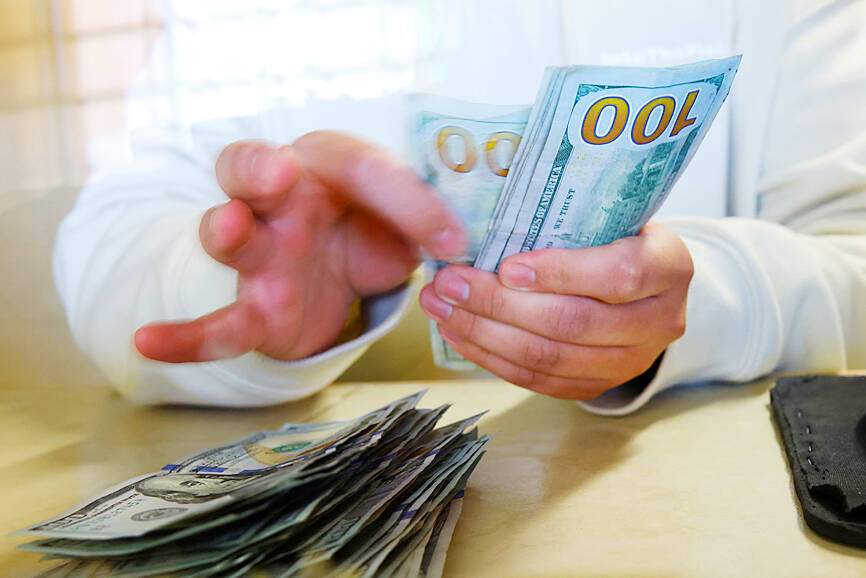The US dollar on Friday slid from a two-and-a-half-month high versus the yen, for its largest weekly loss since mid-January against a basket of six major currencies, as traders stepped back to gauge the path for Federal Reserve policy.
Analysts said the market has for the most part priced in the prospect of a higher terminal Fed funds rate after a recent run of upbeat US economic data.
The yen, which is sensitive to US-Japan long-term rate differentials, halted its six-week losing streak against the dollar, as it gained strength with 10-year US yields retreating from a nearly four-month high.

Photo: Reuters
Cryptocurrencies, on the other hand, took a beating as the crisis surrounding Silvergate Bank worsened, with industry heavyweights such as Coinbase Global and Galaxy Digital dropping the lender as their banking partner.
The US dollar index, which measures the greenback’s value against six major currencies, fell 0.48 percent to 104.53, from as high as 105.36 at the start of the week, its strongest level since Jan. 6. The index slid 0.65 percent for the week, its biggest percentage fall since the week of Jan. 15.
The greenback briefly pared losses after data showed the US services sector grew at a steady pace last month, with new orders and employment rising to more than one-year highs. The Institute for Supply Management’s nonmanufacturing index dipped to 55.1 from 55.2 in January.
“The dollar has essentially enjoyed four full weeks of gains that completely erased the losses in January,” said Juan Perez, director of trading at Monex USA in Washington.
“As markets look to end a tough Q1, there is optimism growing as the focus shifts from the pains associated with inflationary pressures and to the potential for a prosperous second half of the year despite central bank tightening via interest rates,” he said.
Analysts polled by Reuters said that recent dollar strength was likely to be temporary, and the currency would weaken over the course of the year as the global economy improves and on expectations the Fed would stop hiking interest rates well ahead of the European Central Bank.
However, the dollar seems unlikely to reverse its latest uptrend, said Karl Schamotta, chief market strategist at Corpay in Toronto.
“Next week’s job opening and nonfarm payrolls reports could generate a lift in yields and the dollar,” he said. “Traders are likely to move cautiously, particularly in currencies exposed to more dovish local central bank messaging — namely the Aussie, Canadian dollar, and yen.”
The Bank of Japan is expected to start dismantling extraordinary stimulus measures after Governor Haruhiko Kuroda retires next month.
Tokyo inflation data for February exceeded the central bank’s target for a ninth month, but the core measure decelerated from a 42-year high.
The US dollar eased 0.67 to 135.85 yen, after climbing to 137.10 on Thursday, the highest since Dec. 20. For the week, the dollar was down 0.44 percent versus the yen, its worst weekly showing since mid-January.
The New Taiwan dollar on Friday gained against the US dollar, adding NT$0.003 to close at NT$30.627, down 0.48 percent from NT$30.480 a week earlier.
The euro rose 0.36 percent to US$1.0635, after starting the week at a nearly two-month low of US$1.0533.
Additional reporting by staff writer, with CNA

TRADE WAR: Tariffs should also apply to any goods that pass through the new Beijing-funded port in Chancay, Peru, an adviser to US president-elect Donald Trump said A veteran adviser to US president-elect Donald Trump is proposing that the 60 percent tariffs that Trump vowed to impose on Chinese goods also apply to goods from any country that pass through a new port that Beijing has built in Peru. The duties should apply to goods from China or countries in South America that pass through the new deep-water port Chancay, a town 60km north of Lima, said Mauricio Claver-Carone, an adviser to the Trump transition team who served as senior director for the western hemisphere on the White House National Security Council in his first administration. “Any product going

High above the sparkling surface of the Athens coastline, the cranes for building the 50-floor luxury tower centerpiece of Greece’s future “smart city” look out over the Saronic Gulf. At their feet, construction machinery stirs up dust. Its backers say the 8 billion euro (US$8.43 billion) project financed by private funds is a symbol of Greece’s renaissance after the years of financial stagnation that saw investors flee the country. However, critics see it more as a future “ghetto for the rich.” It is hard to imagine that 10km from the Acropolis, a new city “three times the size of Monaco”

STRUGGLING BUSINESS: South Korea’s biggest company and semiconductor manufacturer’s buyback fuels concerns that it could be missing out on the AI boom Samsung Electronics Co plans to buy back about 10 trillion won (US$7.2 billion) of its own stock over the next year, putting in motion one of the larger shareholder return programs in its history. South Korea’s biggest company would repurchase the stock in stages over the coming 12 months, it said in a regulatory filing on Friday. As a first step, it would buy back about 3 trillion won of paper starting today up until February next year, all of which it would cancel. The board would deliberate on how best to effect the remaining 7 trillion won of buybacks. The move

In a red box factory that stands out among the drab hills of the West Bank, Chat Cola’s employees race to quench Palestinians’ thirst for local products since the Gaza war erupted last year. With packaging reminiscent of Coca-Cola’s iconic red and white aluminum cans, Chat Cola has tapped into Palestinians’ desire to shun brands perceived as too supportive of Israel. “The demand for [Chat Cola] increased since the war began because of the boycott,” owner Fahed Arar said at the factory in the occupied West Bank town of Salfit. Julien, a restaurateur in the city of Ramallah further south,